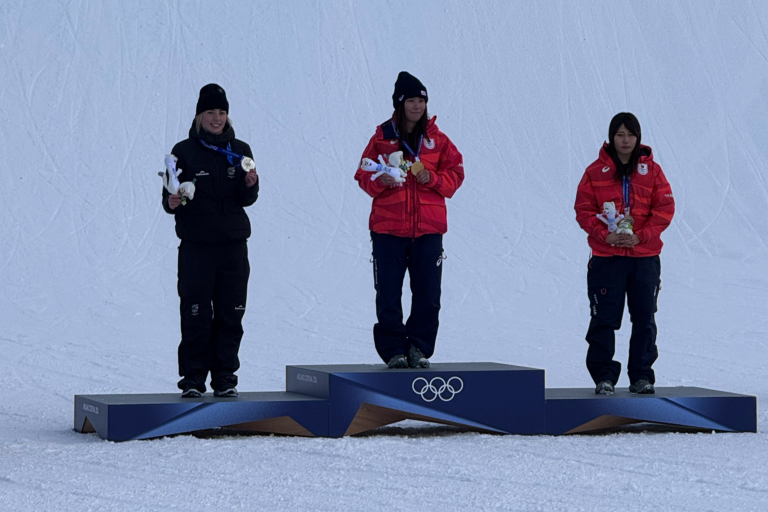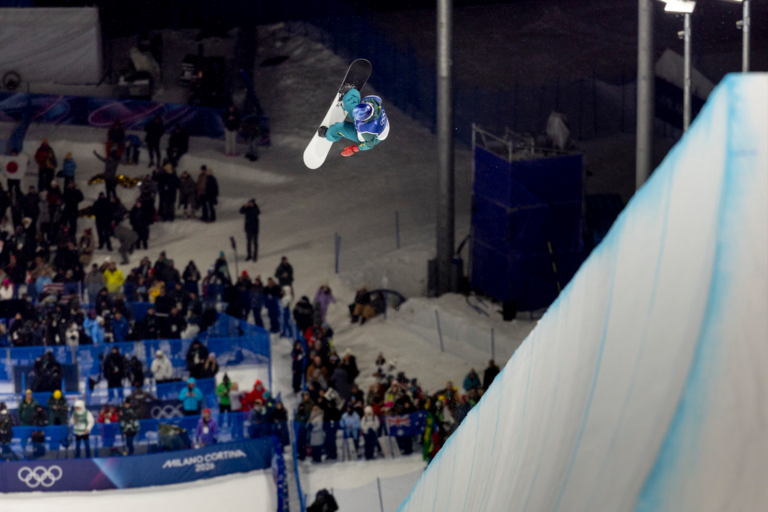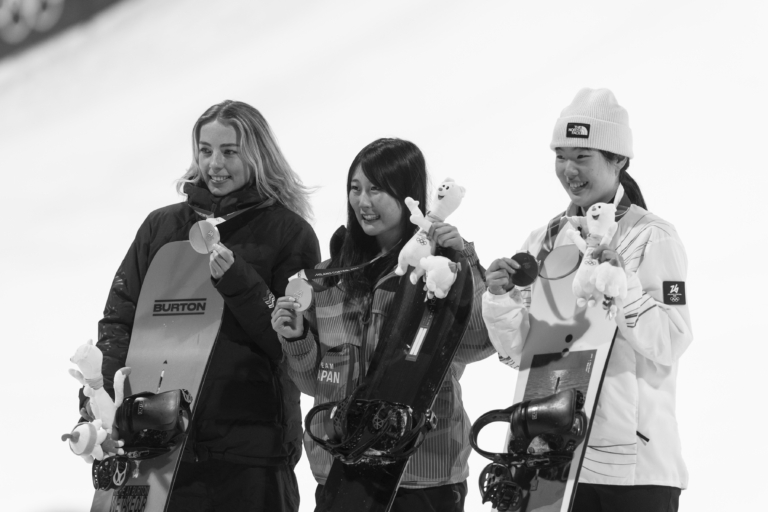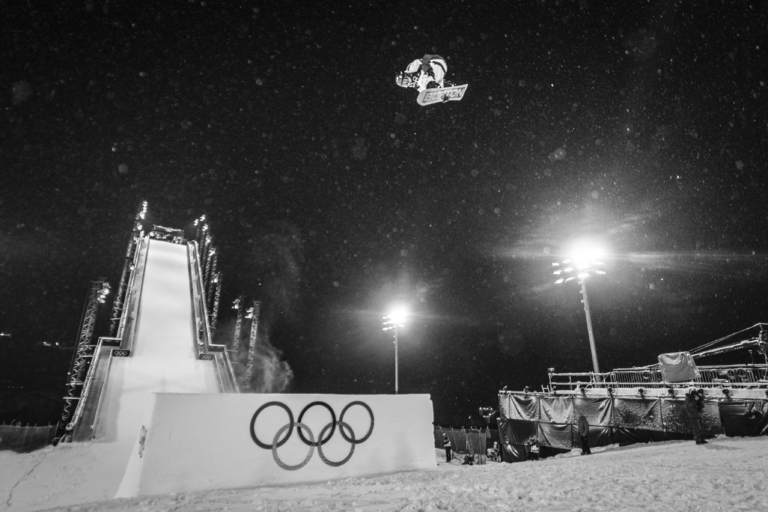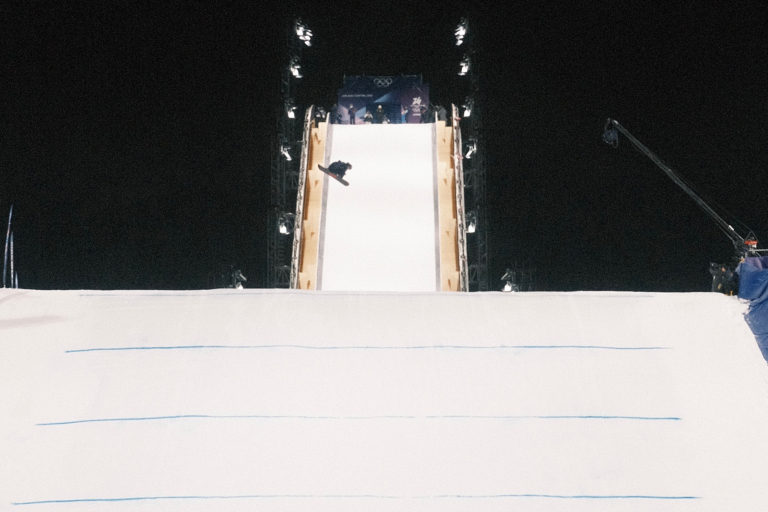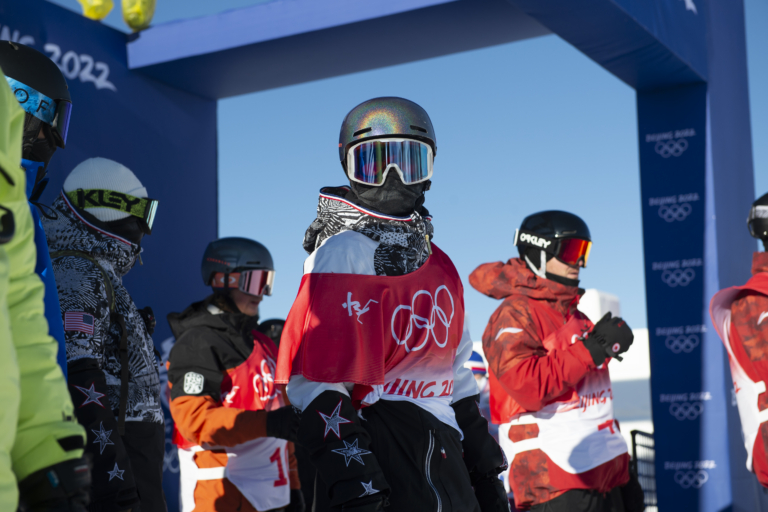I met Vince Sanders for the first time last November at the Never Summer headquarters in Denver, Colorado. Vince has a friendly demeanor that welcomes everyone who steps through the company’s HQ doors—or who sends an email, comes to an event, demos a board, attends a tradeshow…the list goes on—and through this myriad of interactions, he is quick to share his dedication to snowboarding with anyone he meets. His official title at Never Summer is Chairman of the Boards, though around the office he is fondly referred to just as “The Chairman” or “The Legend,” accolades earned by decades of involvement not only at NS, but in the snowboard industry, in general. He would never tell you this, himself, though. The Colorado native’s list of experience and accomplishments is long, but he’s as humble as they come. In fact, when I reached out to him about this interview, the first thing he did was offer up other individuals he felt would be more deserving of the spotlight. That’s just how Vince is, modest and quick to raise others up around him.
“Vince Sanders is the nicest guy you will ever meet,” says Chris Harris, Never Summer’s marketing director. He’s been snowboarding since day one and has done a lot. Like A LOT. “Humility is his middle name,” adds Chris. “Vince was the owner of one of the first snowboard shops in Colorado. The Chairman ran The Boardroom for about twenty years and is responsible for more people in snowboarding than snowboard lessons. He was one of the first-ever Sims pro riders and had a featured part in one of the first snowboard movies ever filmed, Snowboard Meltdown, and was also in the Sims movie, Sims Team One.” He also has been splitboarding before splitboarding was really a thing. “He has claimed first descents on several legendary drops like Mount Sneffles, as well as other peaks in the area—he’s basically ridden every line in Colorado,” says Chris.
And Chris knows, because he sits next to Vince every day as The Chairman applies himself to a multitude of tasks at the brand. Whether communicating with customers, collaborating with marketing, contributing to board design (and of course, R&D), or working with high schoolers and youth groups in the local community, Vince’s wealth of knowledge, experience, and grit touches all facets of the brand, affecting snowboarding in personal, grand, and meaningful ways. The common thread throughout it all, is his excitement to sharing snowboarding with others. Since his days as a rider, rep, shop owner, and now as Chairman of the Boards, bringing people into the fold and helping them to make their own turns is at the heart of everything he does—along with the never-ending pursuit of good snow, too. – Mary T. Walsh
Name: Vince Sanders
Stance: 21” 27/12 positive
Job title: Chairman of the Boards at Never Summer Industries
Where you’re from: Golden, CO
Where you live: Lakewood, CO
Home Mountain: Vail
Instagram: @the___chairman

What is your current job and can you tell us a little bit about what your role entails?
I’m overseeing the customer service team and working with marketing/direct sales. Routinely, my role is that of a spokesperson, doing industry and media interviews on the company.
What does a typical day at work look like for you?
It varies, depending on the time of year. We don’t have a lot of people in the office, so you wear many hats. Typically, I’ll start by going over questions on the [email protected] and [email protected] with our customer service rep, and check Neversummer.com/events for any scheduled tours for the day. Usually, we’ll have marketing, board graphics, new model development, softgoods, or other meetings. We’re going over the 23/24 line and board graphics now, so that’s exciting. I’m also doing the video overviews on the 22/23 line, so we’ll have that ready for the launch of our new website on August 1st. Additionally, I’ve been working on a kick ass, limited edition freeride board called the Valhalla that we hope to drop this season. I do the purchase orders for hats and stickers, so typically I’ll do that, too. I’ll give factory tours daily and help customers in the store and with repairs. Many days I work with a local tech high school on our partnership. I’ll also help fulfill orders and inventory product. End of the day is busy on the live chat on our website and I finish out with taking the deposits to the bank, running errands/checks or whatever else the owner asks of me.
How did you start snowboarding?
Our mom gave my brother and me Burton Backhills for Christmas in 1981. We had a blizzard that Christmas and learned behind our house on Lookout Mountain. After that season, I graduated onto Berthoud Pass. There was a resort up there at the time and they allowed snowboarding. They had a chairlift on one side of the road and a t-bar on the lodge side. There wasn’t any grooming, so it was always either powder or bumps. We would track it out after storms and then hike into the backcountry.
When did you know that you wanted to work in the snowboard industry?
I was going to school at the University of Colorado in Boulder and Tom Sims asked me if I had some extra money. I said I had a little bit and he replied, “Send it to me and I’ll get you a couple boards to sell.” I sent him what I had, and he sent a couple of boards and told me that when I sold them to call him and not blow the money on partying. Those two boards turned into four the next time and so on. Before I knew it, I was selling dozens of boards and had an apartment full of ‘em. I realized then that I could do this for a living.

What was your first job in the industry?
Repping Sims Snowboards.
Between that first job and now, how did you get to where you are currently?
I owned and operated one of the first snowboard shops in Colorado for twenty-two years.
What experiences or lessons have been most valuable to you to get to where you are?
Running a shop gives you so many experiences and lessons, from buying/selling, merchandising, customer service, back shop skills, managing people, etc. I’ve seen so many things in snowboarding—the products, ad campaigns, mistakes and advances in the industry. This broad knowledge and seeing so much at the shop helps me now to assist on guiding the owners on brand decisions or colleagues on day-to-day issues.
What do you feel are some of the most important skills or areas of knowledge necessary for your current role?
Knowing snowboarding’s past, its present, and predicting its future.

What is a skill that you didn’t necessarily think would apply to your current role, but has proven to be invaluable?
Writing is a skill that has proven to be invaluable in my current role. I’ve written many product and technical descriptions for catalogs and online content. I believe that having read so many product descriptions over the years has helped me with this.
What is a challenge in your current role that you didn’t expect and that you have had to navigate?
Public speaking has been something I didn’t expect to have to navigate.
How do you deal with setbacks professionally?
I’ve been through losing my shop and many setbacks and just always think that it’s minor compared to losing a loved one. That is the hardest thing in life. With setbacks professionally, I just force myself to let it go and to keep pushing on. Tomorrow is another day.
Who and/or what do you look up to in the industry for inspiration?
Chris Harris. He is always pushing Never Summer Industries—and me—forward.
What do you feel has been your biggest impact in your area of work?
I feel my largest impact has been in the models that I’ve helped developed. I suggested a constantly progressing, high-end twin snowboard that utilized all the tech and features we could offer and named it the Proto. I’ve been involved with the development of the Raptor, Swift, East, and of course, the Chairman. I’ve had the ideas for some limited boards (most recently the Bone, Epik and Icon splitboards) and they’ve been successful. I initiated our Drag Free or ultra-wide board offering. This has had a lot of positive response and benefited many snowboarders with larger boot sizes. I also brought splitboards into our inline production. Another impact I’ve had to the brand is my constant interaction with our consumers. A lot of shredders in Colorado and elsewhere know me because of this.
What keeps you driven and motivated in your line of work?
How much a Never Summer board means to our fans. It’s much more than just a snowboard and I’ve heard so many heartfelt stories on how much this board/snowboarding has helped them both physically and mentally.
Working in snowboarding is a wonderful, yet often complex combination of our personal passion and professional life. How has this come into play in your experience working in the industry?
Rarely a day goes by where I don’t think about snowboarding. Thinking about it all the time as a job and dealing with problems, I do get burnout, but once I start shredding, all of the problems are erased and I realize that this is why I dedicated my entire life to snowboarding.
If someone was interested in doing what you do, what would you recommend they pursue to reach this goal—whether areas of education or certification, ways to get experience, skills to hone, things to learn, individuals to follow, books to read, internships to apply for, jobs to take, whatever it may be—what do you recommend?
A couple of common pathway into the industry are working in retail, as a tech rep, or participating in internships. Never Summer’s Rocky Mountain sales representative started by working in the factory (after I gave him a tour), attaching metal edges to the bases of the boards. He did various other jobs in the factory and then started working demos and events. This led to him becoming our sales rep. Our direct sales manager started as a board builder and the production manager began as an intern. Most recently, team rider Matt Williams became our web developer. For each of them, snowboarding is their life and it’s natural to transition to another role within the industry.
Lastly, best piece of advice someone has ever given you that applies to your professional life that could be helpful for someone reading this?
Give your best to your employer. It’s one of the best investments you can make.



